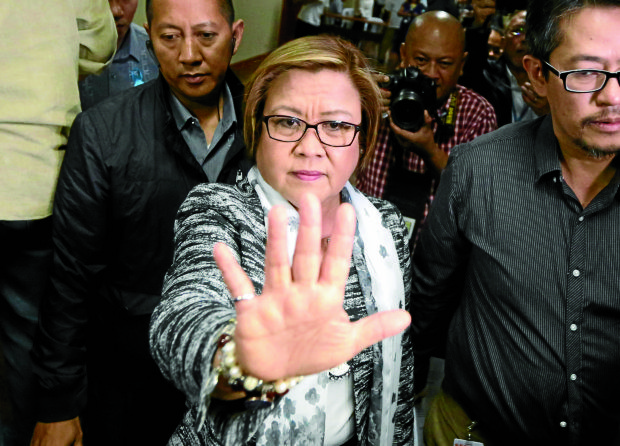The camp of detained Sen. Leila de Lima has vowed to fight the Department of Justice’s (DOJ) bid to bring all three drug cases against her under the judge who had ordered her arrest, saying the prosecution seemed to be “fishing” for what would best serve its interest.
Alex Padilla, one of De Lima’s lawyers, told the Inquirer on Saturday that the legal team would file a written opposition to the DOJ’s consolidation plea filed before the Muntinlupa City Regional Trial Court (RTC) on Friday.
The team is also set to argue against the move in a hearing set on March 10.
Different set of facts
“We are against the consolidation because [the three cases have] different sets of facts and involve different parties. Besides, we are wondering why the prosecution chose to consolidate now when they themselves filed three separate criminal information at the start,” Padilla said when sought for comment.
The prosecution, led by Senior Assistant State Prosecutor Peter Ong, on Friday sought the consolidation of the three cases against De Lima under the sala of Muntinlupa RTC Branch 204 Judge Juanita Guerrero.
Guerrero issued an arrest warrant against De Lima on Feb. 23, barely a week since the prosecution elevated three separate criminal information against the senator for her alleged drug involvement.
‘Undue haste’
De Lima was arrested on Feb. 24. She is now detained at the Philippine National Police Custodial Center in Camp Crame, Quezon City.
Her legal team has a pending petition before the Supreme Court seeking Guerrero’s inhibition for her alleged bias against De Lima, citing her “undue haste and inordinate interest” in issuing an arrest warrant against her.
“It seems they were fishing for the best judge that suits their interest, which is why they want to consolidate with the judge that issued the warrant of arrest,” Padilla said.
The three cases, all nonbailable offenses under the Dangerous Drugs Act, accuse De Lima of sale and trading of illegal drugs, aggravated by her criminal liability as a public official.
The cases were largely based on testimonies of high-profile convicts who claimed that De Lima had profited from the illegal drug trade at New Bilibid Prison during her time as justice secretary.


